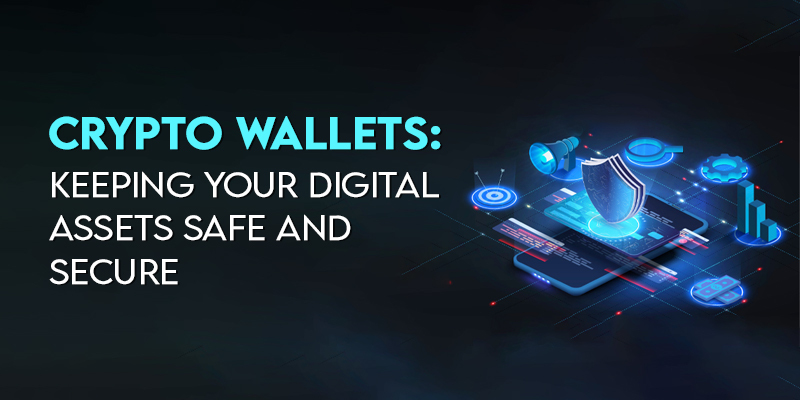Introduction
In the dynamic world of cryptocurrency, where opportunities abound and innovation knows no bounds, ensuring the safety and security of your digital assets is paramount. Imagine you're in a digital realm filled with cryptocurrencies – the exciting, futuristic kind of money that exists only in the virtual world. Just like you have a wallet to keep your physical cash, cards, and IDs safe, you need something similar in this digital dimension to safeguard your digital treasures. That's where crypto wallets step in – they're like your personal vault for your digital coins and tokens.
Think of a crypto wallet as a magical container that holds your unique digital keys. These keys are like secret codes that let you access and manage your cryptocurrencies. Enter crypto wallets – your digital fortress against potential threats and a gateway to hassle-free transactions. In this article, we'll delve into the importance of crypto wallets, their types, and essential tips to keep your digital assets wealth out of harm's way.
Understanding Crypto Wallets: Your Digital Armor
Imagine having a digital piggy bank that's virtually impossible to break into. That's the essence of a crypto wallet. These nifty tools are designed to store, manage, and transact your cryptocurrencies securely. Just like a physical wallet holds your cash and cards, a crypto wallet houses your digital coins and tokens.
Types of Crypto Wallets: A Spectrum of Choices:
1. Hardware Wallets: These are the Fort Knox of crypto wallets. They are physical devices that store your assets ownership offline, away from the prying eyes of hackers. Hardware wallets offer an added layer of security, as they are immune to online attacks. Popular brands like Ledger and Trezor provide users with peace of mind through their tamper-proof designs.
2. Software Wallets: Software wallets come in various forms, catering to different user preferences. Desktop wallets provide a balance between security and accessibility, while mobile wallets offer convenience on the go. Web wallets, on the other hand, are accessible through browsers and are ideal for managing small amounts of crypto assets for regular transactions.
3. Paper Wallets: Imagine writing down your private keys on a piece of paper and storing it in a safe place. That's a paper wallet! It's the most old-school and offline way to store your cryptocurrencies. Just remember: if you lose that piece of paper, your assets are gone forever, although a more traditional approach grants crypto enthusiasts the confidence and peace of mind that their private keys are safely tucked away in a physical, offline form.
4. Online Exchange Wallets: While convenient, these wallets can be risky. When you store your assets on an exchange, you're essentially trusting them with your wealth. If the exchange gets hacked or goes down, you might lose your funds. It's advisable to only keep what you're actively trading on exchanges and move the rest to more secure wallets instead of online wallets.
Top Tips for Keeping Your Crypto Safe and Sound:
:
1. Choose Wisely: Picking the right type of wallet is crucial. If you're a long-term Holder, a hardware or paper wallet might be your best bet. For frequent transactions, a mobile or desktop wallet could be more suitable.
2. Backup, Backup, Backup: Think of your private keys as your golden ticket. Always have backups in multiple secure locations. Losing your private keys could mean losing access to your crypto forever.
3. Stay Updated: Keep your wallet software up to date. Developers often release updates to patch vulnerabilities and enhance security patches. Ignoring these updates could leave you exposed to potential threats.
4. Beware of Phishing: Be cautious of phishing scams. Hackers often disguise themselves as legitimate platforms to steal your private information. Always double-check URLs, especially when entering sensitive information.
5. Two-Factor Authentication (2FA): Enable two-factor authentication whenever possible. This extra layer of security requires you to enter a unique code along with your password, making it much harder for unauthorized users to access your wallet.
6. Offline Storage: If you're not actively trading, consider moving the bulk of your assets to offline storage like hardware or paper wallets. This strategy minimizes your exposure to online threats.
Fortifying Your Digital Wealth:
In a world where digital innovation is the norm, securing your digital wealth protection has never been more crucial. Crypto wallet act as your digital fortress, safeguarding your assets from potential threats. From hardware to software, paper to online exchange wallets, the options are as diverse as the cryptocurrencies themselves.
Remember, your crypto journey is unique. Evaluate your needs, consider your risk tolerance, and select a wallet that aligns with your goals. Keep yourself informed about the latest security practices and trends, and stay vigilant against evolving threats. By doing so, you're not just investing in Crypto Trading – you're investing in your own digital security and peace of mind.
Conclusion:
So, in this captivating world of cryptocurrencies, crypto wallets are your ultimate protectors. They come in all shapes and sizes, offering various levels of security and convenience. Just like you wouldn't keep all your money under your mattress, diversifying your wallet strategy can help keep your digital coins safe.
Whether you're a digital explorer or a futuristic treasure hunter, crypto wallets are your companions, ensuring that your digital riches remain secure and ready for your adventures in the vast landscape of cryptocurrencies. So, pick your wallet wisely, and let the crypto journey begin!
Written By- Manmeet Kaur





Comments